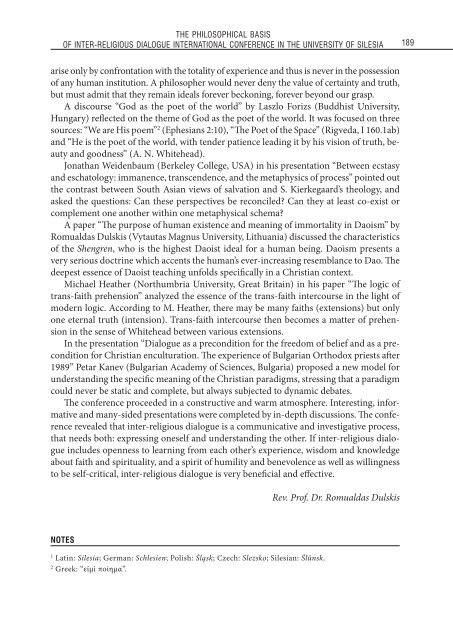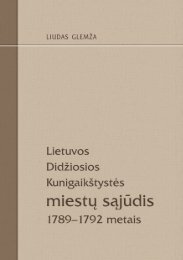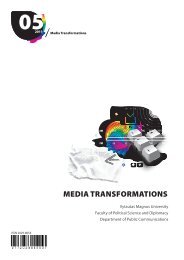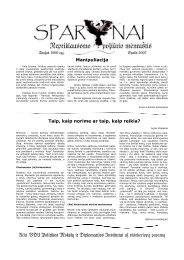Soter Nr. 26 - Vytauto Didžiojo universitetas
Soter Nr. 26 - Vytauto Didžiojo universitetas
Soter Nr. 26 - Vytauto Didžiojo universitetas
You also want an ePaper? Increase the reach of your titles
YUMPU automatically turns print PDFs into web optimized ePapers that Google loves.
THE PHILOSOPHICAL BASIS<br />
OF INTER-RELIGIOUS DIALOGUE INTERNATIONAL CONFERENCE IN THE UNIVERSITY OF SILESIA<br />
arise only by confrontation with the totality of experience and thus is never in the possession<br />
of any human institution. A philosopher would never deny the value of certainty and truth,<br />
but must admit that they remain ideals forever beckoning, forever beyond our grasp.<br />
A discourse “God as the poet of the world” by Laszlo Forizs (Buddhist University,<br />
Hungary) reflected on the theme of God as the poet of the world. It was focused on three<br />
sources: “We are His poem” 2 (Ephesians 2:10), “The Poet of the Space” (Rigveda, I 160.1ab)<br />
and “He is the poet of the world, with tender patience leading it by his vision of truth, beauty<br />
and goodness” (A. N. Whitehead).<br />
Jonathan Weidenbaum (Berkeley College, USA) in his presentation “Between ecstasy<br />
and eschatology: immanence, transcendence, and the metaphysics of process” pointed out<br />
the contrast between South Asian views of salvation and S. Kierkegaard’s theology, and<br />
asked the questions: Can these perspectives be reconciled? Can they at least co-exist or<br />
complement one another within one metaphysical schema?<br />
A paper “The purpose of human existence and meaning of immortality in Daoism” by<br />
Romualdas Dulskis (Vytautas Magnus University, Lithuania) discussed the characteristics<br />
of the Shengren, who is the highest Daoist ideal for a human being. Daoism presents a<br />
very serious doctrine which accents the human’s ever-increasing resemblance to Dao. The<br />
deepest essence of Daoist teaching unfolds specifically in a Christian context.<br />
Michael Heather (Northumbria University, Great Britain) in his paper “The logic of<br />
trans-faith prehension” analyzed the essence of the trans-faith intercourse in the light of<br />
modern logic. According to M. Heather, there may be many faiths (extensions) but only<br />
one eternal truth (intension). Trans-faith intercourse then becomes a matter of prehension<br />
in the sense of Whitehead between various extensions.<br />
In the presentation “Dialogue as a precondition for the freedom of belief and as a precondition<br />
for Christian enculturation. The experience of Bulgarian Orthodox priests after<br />
1989” Petar Kanev (Bulgarian Academy of Sciences, Bulgaria) proposed a new model for<br />
understanding the specific meaning of the Christian paradigms, stressing that a paradigm<br />
could never be static and complete, but always subjected to dynamic debates.<br />
The conference proceeded in a constructive and warm atmosphere. Interesting, informative<br />
and many-sided presentations were completed by in-depth discussions. The conference<br />
revealed that inter-religious dialogue is a communicative and investigative process,<br />
that needs both: expressing oneself and understanding the other. If inter-religious dialogue<br />
includes openness to learning from each other’s experience, wisdom and knowledge<br />
about faith and spirituality, and a spirit of humility and benevolence as well as willingness<br />
to be self-critical, inter-religious dialogue is very beneficial and effective.<br />
NOTES<br />
1 Latin: Silesia; German: Schlesien; Polish: Śląsk; Czech: Slezsko; Silesian: Ślůnsk.<br />
2 Greek: “εἰµὶ ποίηµα”.<br />
Rev. Prof. Dr. Romualdas Dulskis<br />
189





